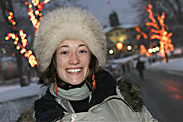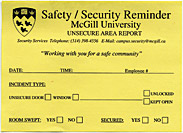In focus
Erin Freeland Ballantyne: Rhodes heads north
Erin Freeland Ballantyne is an honours student in International Develop-ment Studies, a documentary filmmaker, a human rights advocate and an elite cross-country skier. Last December, she proudly became McGill's 125th Rhodes Scholar.

Owen Egan
"Erin is an accomplished student, athlete, volunteer and a wonderfully engaging young person," says McGill's Dean of Students Bruce Shore. "As the 125th Rhodes Scholar, Erin also continues McGill's proud record of having more Rhodes Scholars than any other university in Canada."
Freeland Ballantyne plans to use her Rhodes Scholarship at the University of Oxford to complete a master's of philosophy with a focus on development studies. She has her eye on public service and is keen on helping improve the world.
"If people work hard to change things I definitely believe the world will improve within our lifetime," she says, adding she often stretches her days with projects that matter to her. "Perhaps I don't sleep as much as I should."
She is eager to put her interdisciplinary studies into practice, since her academic and volunteer work has focused on human rights, peace building, co-operatives and alternative theories of development and underdevelopment. Freeland Ballantyne remains actively involved with the Arctic Indigenous Youth Alliance (AIYA), which advocates for the rights of indigenous people in Canada's North-Western Territories.
AIYA is currently raising awareness in Canada's Great North about the proposed Mackenzie Valley gas pipeline, a mega-project on which Freeland Ballantyne is completing a critical documentary. "This is an environmental issue that will greatly affect indigenous people," she stresses.
Freeland Ballantyne plans to eventually return to her native Yellowknife to help affect positive change for indigenous people. "In just a few decades, these people have gone from hunting for their needs to depending on bank loans and Pop Tarts," she says. "They now face many social problems, from alcoholism to family violence. My goal is to help indigenous people move forward while preserving their cultural heritage."
Freeland Ballantyne admits to being homesick at times. "I love Yellowknife! It is so beautiful, so clean and so multicultural," she says. "It is a cosmopolitan city in the middle of nowhere."
In Montreal, Freeland Ballantyne continues the culinary traditions of her homeland, while abstaining from factory meats, even if her native foods are hard to find. "My dad would fly over salted fish and frozen caribou," she explains, adding her Montreal apartment, shared with three roommates, is 99 percent organic.
Because of her concern over waste and the abuse of foreign workers, Freeland Ballantyne buys fair trade produce and plans to one day work in South America to promote sustainable agricultural practices. "Food will be the root of the next revolution," she says.
During her time at McGill, Freeland Ballantyne received the McConnell Award and Marion McCall Daly Award for outstanding scholarly achievement. She is also a four-time recipient of the Yellowknife Elks Scholarship for academics, community involvement and athletics. "One of the things I most liked about Montreal was skiing on its mountain," she says, adding she was part of the McGill Nordic Ski team.
Having now completed her McGill studies, Freeland Ballantyne will travel to communities across Canada's North with an AIYA team to host community and classroom discussions, as well as educational forums concerning the environment and the proposed Mackenzie gas pipeline. "We are planting the seeds for a healthier community of tomorrow," she says. "As Canadians, we can do things so much better to ensure we foster sustainable development."
Come February, she will head to Haiti to film a documentary about community health care practices for AIYA, too. Then Freeland Ballantyne plans to take a couple of months off, since she's worked hard for the past few years. But she doesn't begrudge her heavy workload. "I developed a tremendous work ethic at McGill, where professors really cared and helped cultivate my interests," she says.
She feels surrounded by like-minded people who want to change the world. "I am not alone," she stresses. "And my family has been awesome in supporting me. They have helped me believe that you can do anything you want to do."
 |
||||
|
You'd be surprised how much time there is. The key is not to waste it. |
||||
Be safe and secure
Every night, uniformed security agents working for McGill Security Services visit buildings. They check doors and windows, verify that no unauthorized persons remain after working hours and ensure that fire extinguishers, alarms, sprinkler systems and emergency lights are working properly.

Agents carry a flashlight, a two-way radio and a cigar-shaped scanner that is used to record their verification round. Since January 6, they have also been issuing yellow Post-it notes. These are special safety/ssecurity reminders that will be left on doors and windows the agents find opened or unlocked.
Theft is the single most reported crime at our university and almost all cases do not involve the use of force. Everyone is encouraged to take responsibility for protecting their property. Here are a few tips for discouraging thieves:
- Keep your purse, wallet, keys or other valuable items with you at all times or locked in a drawer or closet.
- Always lock the office door when you leave, even if you are going to the copier, or the office next door.
- Check the identity of any strangers who are in your office — ask who they are visiting and if you can help them find that person. If this makes you uncomfortable, inform security (dial 3000) about your suspicions.
- Email problems to fcc.downtown@mcgill.ca or fcc.macdonald@mcgill.ca) for all broken or flickering lights, doors that don't lock properly or broken windows. Don't wait for someone else to report it.
- At night, place all unsecured office equipment and personal property in a locked desk or cabinet whenever possible; close blinds or curtains.
- Make sure your computer is password-protected.
For more information, go to www.mcgill.ca/security
 |
||||
|
There's too much seat capacity in the U.S. domestic market — too many seats chasing too few bums |
||||
